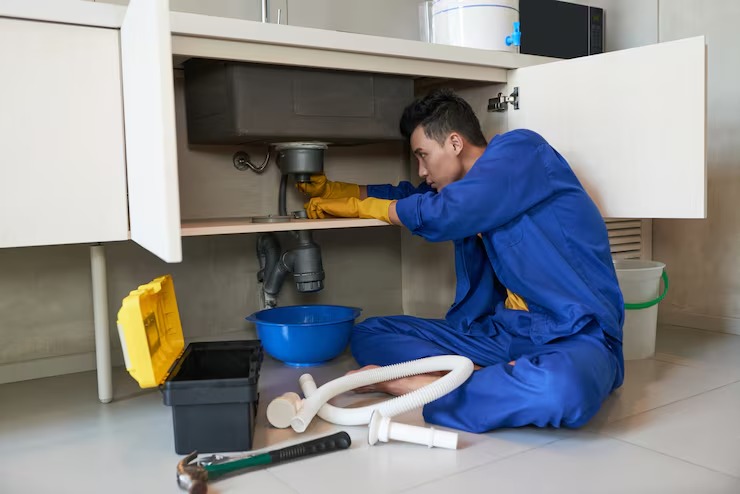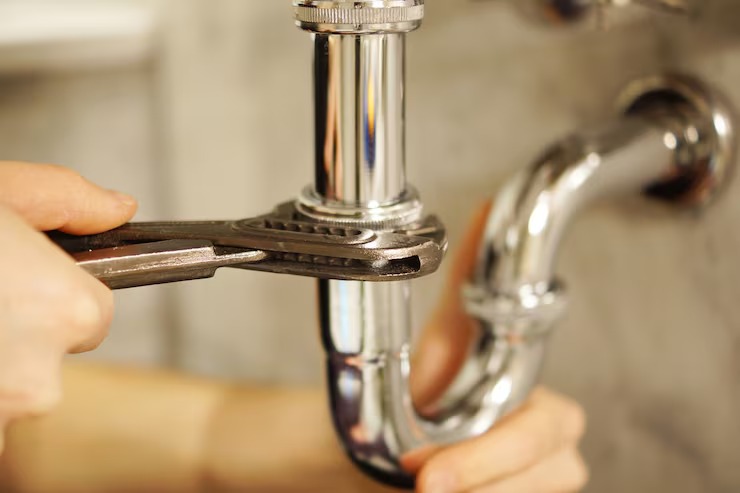How to Prevent a Drain Clog in Your Home
A drain clog is one of the most common plumbing issues homeowners face, often leading to slow drains, foul odors, or even costly backups. Fortunately, with a few simple habits and preventative measures, you can keep your plumbing system running smoothly and avoid the hassle of a blocked drain.
Preventing a drain clog starts with understanding what causes it—things like grease, food scraps, hair, soap scum, and non-flushable items are frequent culprits. Regular maintenance, such as flushing drains with hot water or using a drain strainer, can go a long way in protecting your pipes. In this guide, we’ll walk you through practical tips to help prevent a drain clog in your home and keep your plumbing in top shape.
Watch What Goes Down Your Kitchen Sink
One of the leading causes of a drain clog starts in the kitchen. Many people unknowingly allow food scraps, oils, and grease to go down the drain, which eventually harden and build up in the pipes. Even items like coffee grounds, eggshells, and starchy foods such as pasta or rice can expand and contribute to blockages. To prevent a drain clog, it’s best to dispose of these items in the trash or compost rather than rinsing them away.
Installing a sink strainer is a simple yet highly effective way to catch debris before it enters your plumbing system. Also, avoid pouring grease down the drain—instead, collect it in a container and discard it properly. By being mindful of what you allow into your kitchen sink, you significantly reduce the risk of a drain clog and keep your pipes flowing freely and your kitchen functioning efficiently.

Install Hair Catchers in Bathroom Drains
Hair is one of the most common culprits behind a bathroom drain clog. Whether in the shower, bathtub, or bathroom sink, strands of hair can quickly accumulate and combine with soap residue to form stubborn clogs. To combat this, installing a simple hair catcher or drain screen is a smart and inexpensive preventative measure. These small devices sit over or inside the drain and trap hair before it goes down the pipe, allowing for easy cleanup after every use.
Regularly cleaning the hair catcher ensures it remains effective and prevents the buildup of other debris. Over time, this habit can save you from dealing with slow-draining water or the need for professional plumbing services. Preventing a drain clog in the bathroom starts with small steps like this that help maintain smooth drainage and reduce the chances of costly repairs or inconvenient water backups.
Avoid Flushing Non-Flushable Items
Toilet clogs often result from flushing items that weren’t designed to break down in water. Products like wipes labeled “flushable,” cotton swabs, feminine hygiene products, paper towels, and even dental floss can accumulate in your plumbing system and cause a serious drain clog. These items don’t disintegrate the way toilet paper does and often get caught in bends and joints within the pipes.
Over time, this buildup restricts water flow and leads to backups. To prevent a drain clog in your toilet and sewer line, only flush human waste and toilet paper. Consider placing a small trash can next to the toilet so that other waste items are easily and properly discarded. Educating family members and guests about what should and shouldn’t be flushed can go a long way in maintaining a healthy plumbing system and avoiding expensive sewer repairs or messy overflows.
Clean Your Drains Regularly With Hot Water
Routine cleaning is a simple yet powerful way to prevent a drain clog from forming in your home. One effective habit is flushing your drains with hot water weekly, especially after heavy use in the kitchen or bathroom. Hot water helps dissolve grease, soap scum, and other debris that may be clinging to the inner walls of your pipes. This simple practice can help maintain smooth water flow and prevent small blockages from growing into major problems.
For added benefit, pouring a mixture of hot water and dish soap down the kitchen sink can help cut through built-up oils. You may also alternate with a vinegar and baking soda rinse for natural maintenance. This non-invasive method is safe for most plumbing systems and can be done in minutes. By making hot water flushes part of your cleaning routine, you reduce the chances of encountering a frustrating and costly drain clog.
Keep Grease and Oil Out of Drains
Grease and oil are among the most damaging substances for any household plumbing system, often resulting in a stubborn and slow-developing drain clog. When hot, grease may seem harmless as it easily flows down the drain, but as it cools, it solidifies and sticks to the pipe walls, trapping other debris and narrowing the pathway for water. Over time, this buildup can lead to complete blockages. To avoid this issue, never pour grease or oil into your kitchen sink.
Instead, collect used grease in a heat-safe container and dispose of it in the trash once it has cooled. You can also wipe oily pans with a paper towel before washing them. Taking these precautions helps you protect your pipes and avoid recurring plumbing problems. Preventing a drain clog caused by grease is much easier than trying to remove one after the fact.
Maintain Your Garbage Disposal Properly
A garbage disposal is a helpful kitchen tool, but if misused, it can lead to a drain clog. Many homeowners mistakenly use their disposal as a catch-all for food waste, not realizing that certain items can damage the blades or clog the drain line. Avoid disposing of fibrous vegetables like celery, peels from starchy vegetables like potatoes, coffee grounds, and eggshells, as they tend to create sludge or wrap around the blades.
Run cold water before, during, and after using your disposal to help flush debris through the system efficiently. Also, regularly clean your disposal with ice cubes and citrus peels to remove odors and sharpen the blades. By treating your garbage disposal with care and not overloading it, you reduce the risk of buildup and maintain optimal drain function. Preventing a drain clog starts with smart use and routine upkeep of your kitchen appliances.

Schedule Regular Plumbing Inspections
Routine inspections by a licensed plumber are essential in identifying early warning signs of a drain clog before it becomes a serious problem. Professionals have the tools and experience to detect buildup, slow drainage, or hidden leaks within your system. They can also clear minor obstructions using techniques like hydro jetting or snaking, which prevent them from turning into full-blown clogs. Inspections are especially important in older homes where pipes may be corroded or misaligned.
Having your plumbing system assessed annually not only helps prevent a drain clog but also extends the life of your pipes and fixtures. It’s a small investment that can save you significant money in emergency repairs down the road. Preventative care keeps your drainage system working efficiently and gives you peace of mind knowing your home is protected from unexpected plumbing issues.
Educate Your Household on Proper Drain Use
Preventing a drain clog isn’t just about individual habits—it requires cooperation from everyone in the household. Educating family members, especially children, on what can and cannot go down the drains or toilets is key to avoiding costly plumbing issues. Simple rules, such as not flushing wipes, throwing hair in the trash, and not washing food scraps into the sink, can make a big difference.
Consider posting a small reminder sign in the bathroom or kitchen to reinforce these practices. You can also explain the consequences of a drain clog, including water backups, unpleasant odors, and the need for expensive repairs. Creating a shared understanding of proper drain use ensures that everyone contributes to maintaining the health of your plumbing system. A well-informed household is your first line of defense against the daily habits that can lead to a drain clog and future plumbing emergencies.
Conclusion
Preventing a drain clog is all about being proactive and consistent with your plumbing habits. From avoiding harmful materials in your sink and toilet to scheduling regular maintenance, small steps can make a big difference in keeping your home’s plumbing system in great shape. If you’re experiencing slow drains or want expert help to avoid future clogs, Sunflower Plumbing is here for you. Our experienced team proudly serves El Dorado, Kansas, offering fast, reliable, and affordable plumbing services tailored to your needs. Don’t wait until a minor issue becomes a costly repair—call us today at (316) 333-6326 and let us help you protect your home’s plumbing for the long run.

